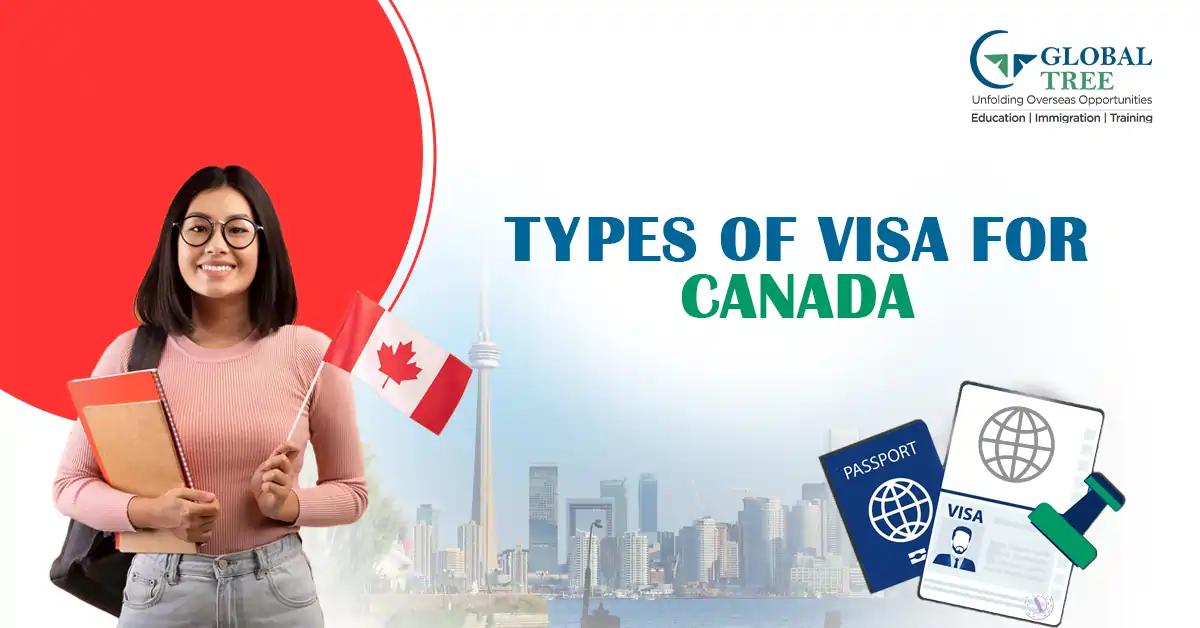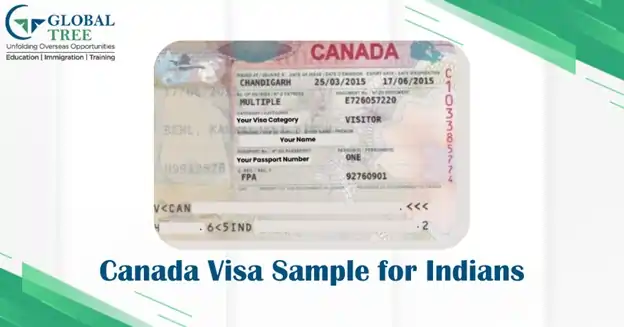All Types of Visa for Canada – A Detail on Guidelines to Apply

- Introduction
- What is a Canada Visa?
- Who Needs a Canadian Visa?
- What are the Canada Visa Types?
- Types of Temporary Canada Visa
- Types of Permanent Canada Visa
- Types of Express Entry Visas
- How to Create and Submit a Canada Visa Application?
- Next Step After a Successful Canadian Visa Application
- What Does a Canadian Visa look like?
- How Long Does it Take to Get a Visa to Canada?
- Can I Help Someone Get a Canada Visa?
- How Can I Extend my Stay in Canada?
- What Happens if I Overstayed my Canada Visa?
- How Much is Canada Visa Fee?
- What if My Canada Visa is Rejected?
- Will I Get a Refund if my Canada Visa Application is Rejected?
- Can I Apply for a Canada Visa From Another Country?
- Do I Need to Submit Biometrics For my Canada Visa Application?
Introduction
Canada is a nation situated in North America, positioned directly north of the United States, and is renowned for its advanced development.
The desire for individuals to visit Canada has been consistently rising in recent years. However, many individuals are curious about the means of gaining entry to Canada.
What is a Canada Visa?
A Canadian visa is an endorsement in your passport that grants you permission to enter Canada. It authorizes you to travel to the country and legally stay there either temporarily or permanently.
Obtaining a Canadian visa indicates that the Canadian Consulate or Embassy in your home country has determined you meet the eligibility criteria for entry.
However, when you arrive at the Canadian border and customs, it's the responsibility of the border officers to assess your suitability for entry.
Your admission to Canada hinges on your truthful and accurate responses to questions posed by Canadian Border Services Officers (BSOs). If you answer their questions honestly and correctly, they will grant you entry.
However, if they suspect that you do not meet the eligibility requirements, they have the authority to refuse your entry and request that you return to your home country, even if you possess a Canadian visa.
Who Needs a Canadian Visa?
Individuals from countries without a visa exemption or Electronic Travel Authorization (eTA) agreement with Canada must obtain a visa to enter the country.
To be precise, approximately 148 countries require a visa for visiting, working, or immigrating to Canada.
If you fall into this category and require a Canadian visa, you must initiate the application process.
The application method may vary depending on the specific type of visa you are seeking, but there are several general steps that you must follow.
What are the Canada Visa Types?
Prior to submitting an application for a Canadian visa, it is essential to determine the type of visa that aligns with your purpose for visiting Canada. Here are the various types of Canada visas available:
- Visitor visas
- Student visas
- Work visas
- Permanent Residence visas
- Business Immigrant visas
- Express Entry Program visas
It is crucial to select the visa category that best suits the reason you wish to travel to Canada.
Types of Temporary Canada Visa
Temporary Canadian visas allow individuals to stay in Canada for a specified duration, typically determined by the Canadian Consulate or Border Services Officers (BSOs), usually up to 6 months. These temporary visas can be categorized as either single entry or multiple entry visas.
A single entry visa permits an individual to enter Canada only once. They can stay in Canada for up to 6 months from the date of their entry and must then return to their home country.
In contrast, a multiple entry visa allows the person to enter Canada multiple times during the validity period of their visa. Each entry enables them to stay temporarily in Canada for the authorized duration, but they must depart before the visa expires.
Here are the types of Canadian Temporary Visas:
- Canada Tourist Visa: Intended for tourists visiting Canada for leisure and tourism purposes.Check out all the details regarding Canada tourist visa here.
- Canada Super Visa: Designed for parents or grandparents of Canadian citizens or Permanent Residents to have extended visits.
- Diplomatic and Official Visa: Granted to officials and diplomats from foreign countries for official duties in Canada.
- Courtesy Visa: Issued to individuals who do not qualify for Diplomatic and Official Visas but hold importance due to their positions or roles, such as members of trade missions or diplomats with tourism intent.
- Canada Business Visa: Provided to individuals or groups traveling to Canada for business purposes.
- Visa to Give Birth in Canada: Granted to pregnant individuals who meet the criteria for temporary stay and wish to give birth in Canada, conferring automatic Canadian citizenship to the newborn.
- Intending Organ Donors Visa: Given to those traveling to Canada to donate an organ to a Canadian citizen or Permanent Resident.
- Canada Facilitation Visa: Issued to Canadian citizens with dual nationalities who lack a Canadian passport but hold a passport from another country due to specific hardships.
- Canada Student Visa: For students with admissions from Canadian universities, required for studies lasting more than 6 months.Check out how to get a Canada Student Visa
- Canada Temporary Work Visa: Granted to individuals with a job offer in Canada for temporary work, requiring a valid job offer letter from an employer.
- Emporary Residence Permit: Issued to those with various purposes for traveling to Canada who are otherwise not admissible for a Temporary Resident Visa (TRV). The permit's duration matches the individual's specific need.
- Working Holiday Visa: Offered to young people from 30 countries, allowing them to work and travel in Canada. Applicants are randomly selected to apply for a work permit.
These visas serve different purposes and cater to various categories of travelers wishing to visit or reside temporarily in Canada.
Types of Permanent Canada Visa
Permanent Canada visas, also known as immigrant visas, enable the holder to establish permanent residency in the country. These visas come in various types, each catering to different eligibility criteria and objectives:
- Immigrant Investor Program: This program is designed for individuals who intend to make substantial investments in the Canadian economy and possess a net worth of at least CAD$800,000. They must invest a minimum of CAD$400,000, which the government will return to them without interest after 5 years.
- Startup Visa Program: The Canada Startup or Business Visa is for individuals who plan to actively contribute to the Canadian economy. Applicants must have a net worth of at least CAD$300,000 and commit to owning and managing at least one-third of a Canadian business. They are also required to create and maintain employment opportunities within 3 years of their arrival in Canada.
- Self-employed Persons Visa: This visa is intended for individuals with expertise in business, athletics, culture, or farming who can establish and manage their own businesses in Canada. Applicants need to demonstrate their ability to finance the business and showcase their skills in their respective areas of expertise.
- Quebec-Selected Skilled Worker Program (QSWP): If you possess one of the occupations in demand in the Canadian province of Quebec and are fluent in French, you can apply for the Quebec Skilled Worker Program. It allows you to permanently move and work in Quebec.
- Family-Sponsorship Program: The Family Sponsorship Visa permits the spouses and dependent children of Canadian citizens or Permanent Residents to immigrate to Canada on a permanent basis.
- Live-in Caregiver Program (LCP): Caregivers who are qualified to care for elderly individuals, disabled persons, or children and live in a private Canadian home can obtain this visa.
These immigrant visas provide opportunities for individuals with different skills, financial resources, and family connections to establish permanent residency in Canada and contribute to its diverse and vibrant society.
Types of Express Entry Visas
The Canada Express Entry Program, established by the Government of Canada, is an electronic immigration program that provides opportunities for people from around the world to apply for Canadian immigration based on their specific skills and qualifications. This program includes several categories:
- Federal Skilled Trades Program (FSTP): This visa category is designed for qualified tradespeople in occupations such as carpenters, aircraft mechanics, crane operators, heavy-duty equipment mechanics, electricians, machinists, ironworkers, welders, plumbers, and more.
- Federal Skilled Worker Program (FSWP): Under the Federal Skilled Worker Program, visas are granted to individuals with professions that are in demand in Canada. Applicants need to assess the current list of required occupations in Canada at the time of their application and meet the required points threshold.
- Provincial Nomination Programs (PNP): The Provincial Nominee Program in Canada (PNP) offers visas to semi-skilled or low-skilled workers who can contribute to the Canadian economy through their work. These workers are allocated to different provinces in Canada where there is a higher demand for their skills and labor.
- Canadian Experience Class: The Canadian Experience Class permanent visa is intended for individuals who hold a temporary student visa or a temporary worker's visa and aim to transition to permanent resident status. They must possess Canadian education or work experience and have integrated into Canadian society.
These pathways within the Canada Express Entry Program provide avenues for individuals with diverse skills and backgrounds to pursue immigration to Canada, contributing to the nation's growth and development.
How to Create and Submit a Canada Visa Application?
The process for applying for a Canadian visa largely depends on the specific type of visa you wish to obtain. To apply for a Canadian visa, follow these straightforward steps:
- Determine Your Eligibility: First, ascertain if you meet the eligibility criteria for the Canada visa you're interested in.
- Create an Online Account: Register for an online account, which is typically required for the application process.
- Compile Required Documents: Gather all the necessary documentation for your visa application.
- Payment of Fees: Pay the applicable visa fees.
- Wait for Processing: Allow time for the Canadian visa processing.
- Passport Submission and Additional Fees: If your application is approved, you may need to submit your passport along with additional processing fees.
- Complete Information: Application Process to Migrate to Canada'- A Step-Wise Guide
- To check your eligibility, the Canadian government offers a user-friendly online questionnaire that assesses your qualifications based on various factors, including personal information, travel history, and the purpose of your visit. Upon completion, the system provides one of three outcomes:
- Eligibility for the selected visa.
- Eligibility for a different visa type matched by the system.
- Ineligibility for the visa.
- If you are deemed eligible, you will receive a set of documents, including a reference code, via email. This reference code is crucial for initiating your application and should be securely stored. Applying for most visas is done online, and you will need to create an account using your banking details or a Government of Canada login (GCKey).
- Once your account is set up, you can begin your application using the provided reference code. The system will display a checklist of required documents for your specific visa type, which you must submit online.
- After document submission, you will be directed to a payment page to settle the visa fees, which vary depending on the type of visa you are applying for. Following successful payment, your application will be submitted.
- Typically, it takes approximately 5 working days for your application to be visible in your account. If you apply in person, you will need to bring your documents to the Canadian Embassy in your home country.
- The Canadian Embassy will process your visa application, which may take two or more weeks, depending on the visa type. You may be asked for additional documents, biometrics, or an interview, requiring an in-person visit to the Embassy.
- All communication and notifications regarding your visa application will be posted on your online account, so it's important to regularly check for updates, even if you didn't need to submit biometrics or attend an interview.
- If your Canada visa application is approved, you will need to submit your passport to the Canadian Embassy, along with processing fees. These fees vary based on the visa type and typically range from $20 to $50, payable by check or money order. You are also responsible for providing a return envelope for your passport.
- Embassy officials will process your passport, affix the visa, and return it to you via mail. In the case of immediate visa approval following an interview, you will need to pay processing fees on-site and receive your passport immediately.
Next Step After a Successful Canadian Visa Application
- Upon receiving your Canadian visa, you are eligible to travel to Canada.
- When you arrive at the Canadian entry point, you will be required to present your passport and relevant documents.
- Immigration officials will inspect your documents and may ask you a series of questions regarding the purpose of your visit to Canada.
- Based on your responses and their evaluation of your documents, the officials will make a determination regarding your entry into the country. It's important to understand that the officials at the entry point have the authority to grant or deny your entry into Canada.
- They may refuse entry if they have concerns about your potential involvement in criminal activities or if they believe you may not adhere to the restrictions outlined in your visa.
- It's crucial to recognize that having a Canadian visa does not automatically guarantee entry into Canada; the final decision rests with the border officials who assess your eligibility and intent to visit the country.
What Does a Canadian Visa look like?
A Canadian visa typically appears as a stamp within the passport and has a distinctive appearance. While it typically does not feature a photograph, it contains essential information, including:
- The location where the visa was issued.
- The date of issuance and expiration.
- The number of entries allowed.
- Document number.
- Visa category.
- Visa type.
- The last and first name of the visa holder.
- Passport number.

How Long Does it Take to Get a Visa to Canada?
- The processing time for a Canadian visa can vary significantly based on the specific circumstances of each case.
- Typically, it may take anywhere from two to four weeks or potentially even longer to process a Canadian visa application.
- It's important to note that the processing time clock starts ticking once the Canadian authorities have received your complete and accurate application.
- Any requests for additional documents or information can lead to delays in the processing time. Therefore, providing a comprehensive and well-documented Canada application from the outset can help expedite the visa processing process.
- Applicants should also be aware that processing times may fluctuate due to various factors, including the type of visa being applied for and the volume of applications being processed at any given time.
- Therefore, it's advisable to submit your application well in advance of your planned travel date to allow for any potential processing delays.
Can I Help Someone Get a Canada Visa?
If you wish to invite a family member or friend who is residing abroad to visit Canada, you can compose a Letter of Invitation.
This letter should contain specific details about both the person you are inviting and yourself. Here's the information to include in the Letter of Invitation:
About the person you are inviting:
- Full name and date of birth
- The purpose of their visit to Canada
- The intended duration of their stay in Canada and their planned departure date
- Contact information for the person you are inviting
- Your relationship with the individual
- Details about where they will stay during their visit
- Information regarding how they plan to finance their trip
About you:
- Your full name and date of birth
- Your occupation
- Your residential status in Canada (whether you are a Canadian citizen or permanent resident)
- Details about your immediate family members, including their names and dates of birth (spouse and dependents)
- The number of people residing in your household
It's important to note that while a Letter of Invitation can provide supporting information for a visa application, it does not guarantee that the person will receive a Canada visa. Each visa application is assessed on its individual merits, and various factors are considered during the evaluation process. However, a well-prepared Letter of Invitation can be a helpful component of the application and may provide additional context for the applicant's intended visit.
If you intend to sponsor a family member for permanent or long-term residency in Canada, there are specific programs, such as the Canada Family Sponsorship Program, designed for this purpose. These programs have their own application processes and requirements, and they enable eligible individuals to sponsor their family members to join them in Canada on a more permanent basis.
Additionally, you can also apply for a Canada Dependent Visa.
How Can I Extend my Stay in Canada?
If your Canadian visitor visa is nearing its expiration date, and you wish to extend your stay in Canada, you can apply for a visa extension, which is formally known as a Canada Visitor Record. It's important to initiate the process for a visa extension at least 30 days before your current visitor visa expires.
In addition to extending a tourist visa, you also have the option to change your study or work permit to a Visitor Record while you are inside Canada. This flexibility allows you to transition from one type of permit to another without leaving the country.
However, it's crucial to note that a Visitor Record is only applicable for individuals who are already inside Canada. If you exit Canada and wish to re-enter, you will not be allowed entry using a Visitor Record. In such cases, you would typically need to apply for the appropriate visa or permit from outside Canada before returning.
Applying for a visa extension or changing your permit status can involve specific requirements and documentation, so it's advisable to consult with Canadian immigration authorities or seek legal guidance to ensure a smooth and compliant process.
What Happens if I Overstayed my Canada Visa?
If you have exceeded the expiration date of your visa in Canada, the appropriate course of action depends on the duration of your overstay:
Overstay of Less Than 90 Days: If you have overstayed for a period of less than 90 days, you have the option to restore your visitor status by applying for a Visitor Record and selecting the option to "Restore my status as a visitor." This allows you to rectify your immigration status and continue your stay in Canada legally.
Overstay of More Than 90 Days: If you have overstayed your visa for a period longer than 90 days, you generally cannot apply to restore your status within Canada. In such cases, you are required to leave Canada and return to your home country or another location outside Canada. Overstaying for an extended period may have consequences, including potential difficulties in obtaining another Canada visa in the future.
It's essential to emphasize that overstaying a Canada visa is not advisable. If you anticipate that you will need to stay in Canada beyond the duration of your visa, it is strongly recommended to apply for a visa extension before your current visa expires. Properly maintaining your immigration status and adhering to the terms of your visa is essential to avoid potential immigration issues and ensure a smooth experience during your stay in Canada.
How Much is Canada Visa Fee?
The fee for a Canada visa can vary depending on the type of visa you are applying for. Additionally, there may be different types of fees associated with your visa application, including a processing fee and a biometrics fee.
The standard fee for a Visitor Visa (also known as a Tourist Visa) for most applicants was $CAN185 for Indians. However, please note that fees are subject to change, and it's essential to check the most up-to-date fee information on the official website of the Government of Canada or the website of the Visa Application Center (VAC) handling your application. These fees can change over time, so it's crucial to verify the current fee amounts before submitting your visa application.
[Also Check out: How much money do you Need to Immigrate to Canada?]
What if My Canada Visa is Rejected?
If your Canadian visa application is declined, you have the option to submit a new application at any time, as long as your rejection letter does not explicitly prohibit reapplication. However, you can proceed with a re-application only if your circumstances have undergone a change or if you possess additional information that could potentially enhance your chances of obtaining approval for a Canadian visa.
In regard to appeals, it's important to note that there is no established procedure for appealing a decision on a Canadian tourist visa. The avenue for appeals is limited to refugee and permanent residency applications, and these appeals are handled by the Immigration Appeal Division (IAD).
Complete information: 9 Reasons why Canadian Student Visa get Rejected & Ways Ou
Will I Get a Refund if my Canada Visa Application is Rejected?
Canada visa fees are generally non-refundable, even in the event of a rejected application. This is because the fee covers the processing of your visa application rather than the visa itself.
Nevertheless, there are certain circumstances in which you might be eligible for a refund, primarily if you withdraw your application before it has entered the processing stage. Once processing has commenced, refunds are typically not granted.
Moreover, specific fees related to various visa categories may be eligible for refunds, including:
- The fee for the Right of Permanent Residence
- The fee for the Right of Citizenship
- The fee for an Open Work Permit
- The fee for International Experience Canada (IEC)
- The fee for Employer Compliance
Requests for refunds can be made through the Government of Canada's Immigration and Citizenship website.
Can I Apply for a Canada Visa From Another Country?
In certain situations, there may not be a Canadian embassy or Visa Application Center (VAC) in your country of residence. When this occurs, you might need to travel to another country to apply for a Canada visa.
However, it's crucial to ensure that you apply for your visa at the Canadian embassy or VAC that is responsible for your jurisdiction, which typically corresponds to the country you are legally residing in.
Furthermore, if you are a resident of Country A but possess a residence permit for Country B, you can still apply for a Canadian visa from Country B. However, if you are merely visiting Country B and do not hold legal residency there, you must apply at the Canadian embassy or Visa Application Center that covers your jurisdiction in your home country.
For the process of providing biometrics, you can do so at a Canadian Visa Application Center. You will receive a letter from the Canadian embassy specifying the date for your biometrics appointment. To receive this letter, you must pay the biometrics fee when submitting your Canada visa application.
Visa Application Centers are located worldwide, and you can find the one nearest to you by visiting their website, where you can also obtain information about their fees and services.
Check this Article out for a clear example: Every Doubt Answered: Move to Canada from USA
Do I Need to Submit Biometrics For my Canada Visa Application?
Yes, for most Canada visa applicants, submitting biometrics, which includes fingerprints and a photograph, is a requirement regardless of the type of visa they are applying for.









